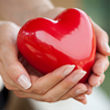Love Your Heart
Date Posted:30 October 2012

How is worry reduced?
Did you know that the human heart consists of two separate, but connected hearts? The physical heart acts as a pump to keep the body alive, while the emotional heart is the fountain of the whole spectrum of positive and negative experiences, from happiness to sadness. Loving your heart has many benefits!
Your heart is a very busy muscle pumping litres of blood around your body via blood vessels, which transport oxygen from the lungs and nutrients from the gastrointestinal system to the cells of your body. It then collects waste and carries it away from the cells to be expelled. And it is happening all the time - when you are asleep and every moment of your life.
The heart truly does nourish us and when impaired, heart disease is the number one worldwide killer of men and women. It’s pervasive impact can be seen in the United States where heart disease is responsible for 40 percent of all deaths, more than all forms of cancer combined.
- For something that is the leading cause of death throughout the world, many of the risk factors indicate it is largely due to unhealthy lifestyle choices and therefore, in many cases preventable
- Excess stress, inactivity, being overweight, too much fat in the diet, sugar intolerance or diabetes, high cholesterol, high blood pressure and smoking are all risk factors for developing heart problems
The Ayurvedic Perspective
The health of our heart according to Maharishi Ayurveda is governed by three sub areas that are responsible for
- Emotional balance (Sadhaka Pitta) When emotional balance is threatened it can give rise to anger, frustration, high blood pressure and in extreme cases heart attack, stroke and chest pain. Overwork, anger, stress, stimulants such as alcohol, cigarettes, drugs and excess caffeine all contribute towards emotional imbalance.
- Strength and stability of the chest area (Avalambaka Kapha) When strength and stability of the chest is threatened it can cause lethargy, chest congestion, heart pain, build up of high cholesterol and plaque in the arteries.
- Blood flow and heart beat (Vyana Vata). Stress, anxiety and overstimulation of the senses can contribute to problems in blood pressure and heart arrhythmia.
Healthy Heart Action Plan
Here is an all-round program to help support recovery and for prevention that targets all three areas:
- Cardio Support tablets to strengthen the heart for emotional challenges; to enhance natural resistance to stress, to fortify heart muscle and to help cleanse and assist blood flow and heart beat.
- Cholesterol Protection if required, or Rejuvenation Plus a high potency antioxidant and deep tissue cleanser and rejuvenative.
- Worry Free tablets after breakfast and evening meals.
- Do a daily oil massage to the full body and drink the recommended tea every 30-60 minutes:
- Use Kapha Massage Oil if you are overweight or have high cholesterol; drink Be Trim Tea or Kapha Tea; Favour Kapha reducing foods (see the food list)
- Use Pitta Massage Oil if you have a tendency for heat, are feeling driven or angry; drink Tranquilitea or Pitta Tea; Favour Pitta reducing foods (see the food list)
- Use Vata Massage Oil if you have a tendency for worry, fear and anxiety; drink Worry Free Tea or Vata Tea; Favour vata reducing foods (see the food list)
- Relax and balance your rest and activity with a good daily routine, regular meals and warm oil massages. Transcendental Meditation is particularly soothing as the heart beat is found to become balanced and steady and blood pressure problems are found to normalise with regular practice. In fact, in the CSIRO book called The Healthy Heart Program, Transcendental Meditation is cited as the only meditation technique which has been found to be of significant benefit to the heart.
A helping hand…
Pulse diagnosis provides the Ayurvedic practitioner with a non-invasive tool to determine the health of your heart allowing tailored recommendations to be made. To see if there is a Maharishi Ayurveda Practitioner near you click here. If you have a question use our Ask the Expert free service.
The Get Balance Team
This information is not intended to be a substitute for professional medical advice, diagnosis or treatment. You should always seek the advice and guidance of a qualified health provider.


